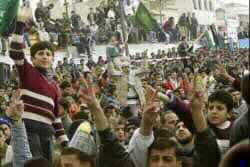Thousands of protesters spilled on to the streets of some Arab capitals after Muslim Friday prayers and clashed with police trying to contain the anger at the U.S.-led war against Iraq. For a second day, demonstrations swept the Arab world against the U.S.-led invasion intent on ousting Iraqi President Saddam Hussein. Protests also erupted in several European cities.
In the Yemeni capital, Sanaa, an 11-year-old boy and another protester were shot dead in a clash between police and anti-war demonstrators, an Interior Ministry official said. Security sources had earlier said one of those slain was a policeman.
Nine marchers and 14 policemen were hurt in the clash that flared after police blocked about 3,000 protesters from marching on the U.S. embassy in the Arab state, the official said.
In Cairo, the biggest city in the Arab world with almost 17 million people, at least 5,000 angry protesters clashed with police using water cannon outside the historic al-Azhar mosque.
In a rare statement, Egypt's Interior Ministry appealed to citizens to vent their frustration in an orderly manner through previously authorized demonstrations.
In Jordan, thousands of protesters fought baton-wielding riot police after the authorities sealed off parts of the capital, Amman, to foil Islamist organized pro-Iraq protests.
Scores of young people were injured and several arrested as police used tear gas to disperse worshippers in the city's Wihdat area, a predominately Palestinian refugee neighborhood.
King Abdullah, a close friend of Washington, later urged his countrymen to moderate expressions of sympathy for Iraqis.
In Mauritania in northwest Africa, police fired tear gas to disperse thousands of anti-war protesters, who poured on to the streets of the capital, Nouakchott, chanting, "Bush is a butcher" after Friday Muslim prayers at the city's mosques.
ANGER IN EUROPE
In Italy, about 200,000 farmers marched through Rome for peace, waving rainbow-colored flags and paralyzing traffic.
In Germany, more than 10,000 rallied. Activists blocked entrances to a U.S. military base in the southern city of Stuttgart as well as the American embassy in Berlin.
Stuttgart police carried about 50 sit-down protesters away from the gates of the U.S. European command headquarters (EUCOM), which is involved in logistics for the Iraq war.
Around 1,000 students in the French capital, Paris, staged an impromptu anti-war sit-down on Place de la Concorde.
In The Hague, Dutch police arrested five people who entered a secured area surrounding the U.S. embassy and poured fake blood on white clothes they wore. They were later released.
In the Lebanese capital Beirut, police used tear gas and water cannon to hold back hundreds of stone-throwing youths who tried to march toward the U.S. mission.
Hundreds of protesters in Bahrain, the headquarters of the U.S. Fifth Fleet, also took to the streets to show their fury.
In Kuwait -- which a U.S.-led coalition freed from Iraqi occupation in 1991 and which was a key staging post for the current invasion -- worshippers said Iraqis had suffered enough.
In many Middle Eastern cities, Muslim preachers fired up their congregations with powerful sermons denouncing the war.
From non-Arab Iran in the east to Morocco in the West, imams, prayer leaders at mosques, accused Washington of stealing the region's resources and seeking global hegemony.
In Iran, which fought an eight-year war with Iraq in the 1980s, Tehran's Friday prayer leader Ayatollah Ahmad Jannati said the U.S. "aim is to dominate Iraq's oil wells and also to dominate the region, and give Israel the security and guarantee that nobody could harm it."
PHOTO CAPTION
Anti-war protesters call for peace during a demonstration at the al-Wihdat refugee camp for Palestinians in Amman, Jordan, Friday March 21, 2003. (AP Photo/David Guttenfelder)
- Author:
& News Agencies - Section:
WORLD HEADLINES


 Home
Home Discover Islam
Discover Islam Quran Recitations
Quran Recitations Lectures
Lectures
 Fatwa
Fatwa Articles
Articles Fiqh
Fiqh E-Books
E-Books Boys & Girls
Boys & Girls  Women
Women










